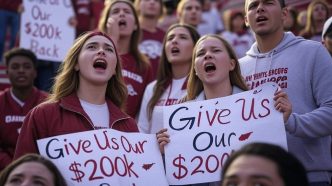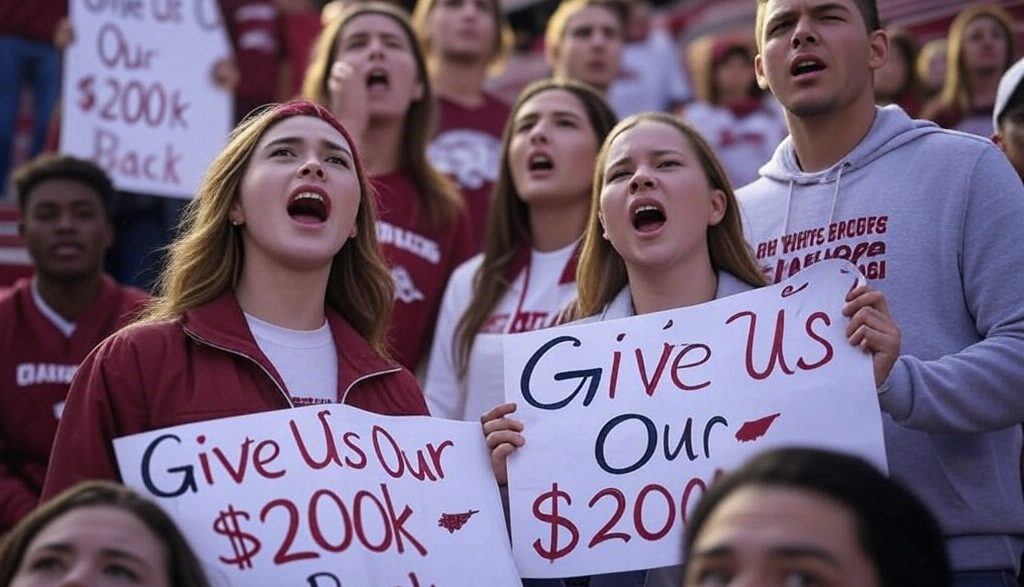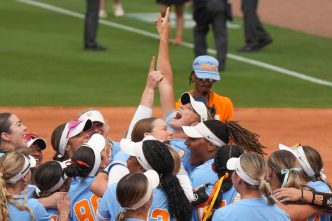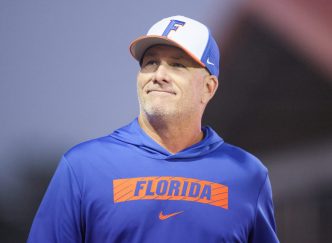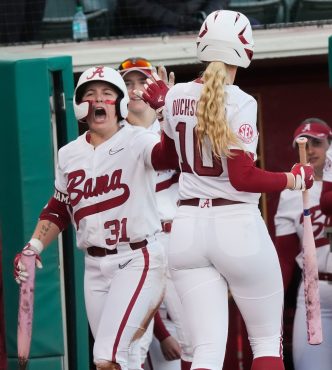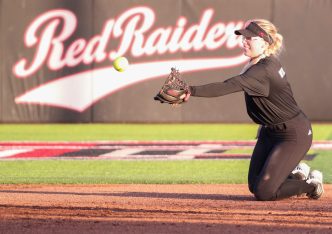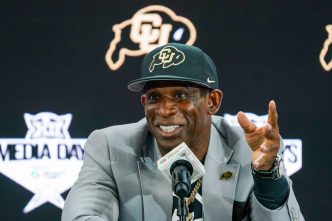The Situation: Madden Iamaleava and Arkansas’ NIL Investment
Madden Iamaleava, a highly touted quarterback prospect, initially committed to the Arkansas Razorbacks as part of their 2024 recruiting class. Iamaleava, the younger brother of Tennessee Volunteers quarterback Nico Iamaleava, was seen as a potential future star for the Razorbacks. To secure his commitment, Arkansas’ NIL collective reportedly offered him a lucrative deal valued at approximately $200,000, a significant sum reflecting the program’s investment in his potential to lead the team.
However, Iamaleava’s tenure with Arkansas was short-lived. After entering the transfer portal, he ultimately decided to leave the program, reportedly seeking opportunities elsewhere due to a lack of immediate playing time or a better fit for his career goals. While the exact reasons for his departure remain speculative, the move has left Arkansas fans and boosters feeling betrayed after the substantial financial commitment made through the NIL collective.
The NIL Landscape: A New Frontier in College Football
The rise of NIL deals has fundamentally altered college athletics since the NCAA allowed athletes to profit from their name, image, and likeness in 2021. Collectives—groups of boosters, donors, and businesses pooling funds to offer NIL deals—have become a critical tool for programs to attract top talent. Arkansas’ collective, like many others, operates to provide financial incentives to players, often in exchange for their commitment to the program.
However, the Iamaleava situation underscores a growing challenge in the NIL era: what happens when a player takes the money and then leaves? Unlike traditional scholarships, which come with clear contractual obligations, NIL deals often exist in a legal gray area. While some agreements include clauses requiring repayment or performance benchmarks, others do not, leaving programs vulnerable when players transfer.
A search on X reveals the polarizing nature of this issue. Some fans support Arkansas’ demand for repayment, arguing that Iamaleava should return the funds if he’s no longer with the program. One user,
@HogFan4Life, posted: “If Madden took $200K and then bailed on us, he needs to pay it back. That money was for Razorback football, not his personal bank account.” Others, however, see the situation as a cautionary tale for collectives.
@CFBInsider tweeted: “This is why NIL deals need better contracts. You can’t just hand out $200K with no strings attached and expect loyalty in today’s game.”
Arkansas Fans React: A Mix of Frustration and Determination
The image of Madden Iamaleava in an Arkansas uniform, paired with the On3 post, has reignited fan frustration. Razorbacks supporters have long prided themselves on their passionate loyalty to the program, and the idea of a player accepting significant NIL money only to transfer has struck a nerve. On X, hashtags like #ReturnTheMoney and #HogNation have trended as fans voice their discontent.
Some Arkansas fans have taken their frustration a step further, organizing protests and calling for accountability. A separate image circulating on X shows Razorbacks fans holding signs reading “Give Us Our $200K Back” outside a team facility, with many wearing the team’s signature red and white gear. The sentiment is clear: fans feel that Iamaleava’s departure is a betrayal of their investment, both emotional and financial.
However, not all reactions are purely negative. Some fans and analysts have pointed out that Iamaleava’s decision to transfer may have been driven by factors beyond his control, such as coaching changes, depth chart competition, or a desire for a better fit.
@RazorbackTalk noted: “Madden was a kid trying to make the best decision for his career. Blaming him for taking the money and leaving ignores the bigger issue—NIL deals need clearer rules.”
The Legal and Ethical Questions
The Arkansas NIL collective’s demand for $200,000 raises significant legal and ethical questions. Legally, the enforceability of their claim depends on the terms of Iamaleava’s NIL agreement. If the deal included a clause requiring repayment in the event of a transfer, the collective may have a strong case. However, if no such clause exists, their demand could be more of a public pressure tactic than a legally binding obligation.
Pete Nakos, the reporter credited in the On3 post, has provided additional context on X. He noted that Arkansas’ collective is working with legal counsel to explore their options, but the lack of precedent in NIL disputes makes the outcome uncertain. “This could set a major precedent for how NIL deals are structured moving forward,” Nakos wrote in a follow-up post. “Collectives are starting to realize they need ironclad contracts to protect their investments.”
Ethically, the situation is murkier. On one hand, Iamaleava accepted a significant sum of money, presumably with the understanding that he would contribute to the Arkansas program. On the other hand, the transfer portal is a fundamental part of modern college football, giving players the freedom to seek better opportunities. Should athletes be penalized for exercising that freedom, especially when NIL money often comes with few formal strings attached?
What’s Next for Madden Iamaleava and Arkansas?
As of April 23, 2025, Madden Iamaleava has not publicly responded to the Arkansas NIL collective’s demand. His current whereabouts in the transfer portal remain unclear, though rumors on X suggest he may be considering programs like UCLA or Oregon, where he could compete for a starting role. Wherever he lands, this controversy is likely to follow him, potentially impacting his reputation and future NIL opportunities.
For Arkansas, the situation is a wake-up call. The Razorbacks’ NIL collective will likely reevaluate how they structure deals to include stricter repayment clauses or performance benchmarks. The program, under head coach Sam Pittman, is also looking to rebound from a challenging 2024 season, and distractions like this could hinder their recruiting efforts in an increasingly competitive SEC.
The broader college football world is watching closely. The Iamaleava case could prompt a wave of new regulations around NIL deals, as schools and collectives seek to protect their investments in an era where player mobility is at an all-time high. For now, Arkansas fans are left hoping for resolution—whether that means getting their $200,000 back or moving forward with a renewed focus on the future.
Conclusion
The Arkansas NIL collective’s demand for $200,000 from Madden Iamaleava is more than just a financial dispute—it’s a symbol of the growing pains in the NIL era. As college football continues to evolve, cases like this highlight the need for clearer rules, better contracts, and a balance between player freedom and program loyalty. For Razorbacks fans, the frustration is palpable, but the outcome of this saga could shape the future of NIL deals for years to come.

